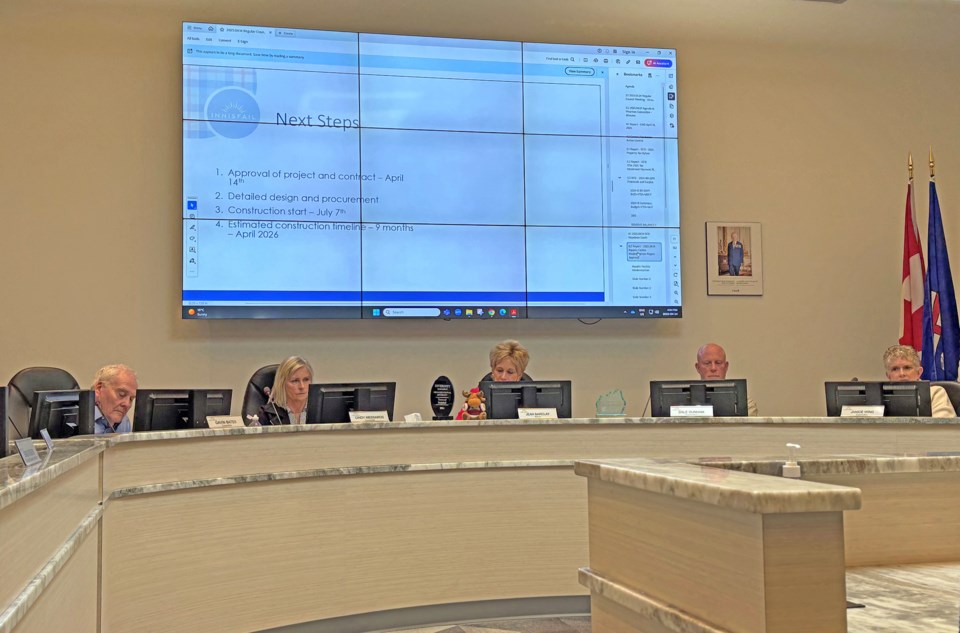INNISFAIL – The much-maligned and recently scrapped carbon tax was front and centre with the Town of Innisfail's council last week.
The discussion at council’s regular meeting on April 14 was not about it still being onerous for local taxpayers.
Instead, it was about how it could be turned around to save taxpayers’ money.
Mayor Jean Barclay noticed the carbon tax was still a $120,000 line item for the entire year on the town’s budget, despite it being cancelled nationwide on April 1.
She was keenly aware administration was already proposing a big tax rate cut from 2.82 to 1.4 per cent but she now wanted it cut even more.
“I just wonder how much we can put on people's shoulders,” said Barclay, noting taxpayers’ escalating bills, a 12 per cent hike on education property taxes, and administration reporting a $703,489 surplus. “So, I'm wondering if there could be an adjustment with the carbon tax.”
On April 14 administration presented the town’s 2025 Property Tax Bylaw for approval.
Last December, town council approved an operating budget of $28,532,772 and a capital budget of $21,249,219 for 2025 and settled on a 2.82 per cent property tax rate for Innisfailians in 2025.
That final rate came a long way down from early predictions.
Prior to the 2025 budget deliberations last November Erica Vickers, corporate services director for the Town of Innisfail, said “current” requirements for operating increases would require a 6.53 per cent tax increase.
Council and administration got it down to 2.82 per cent by the end of three days of budget deliberations.
Five months later when the 2025 Property Tax Bylaw was prepared for council’s approval the tax rate was cut in half to 1.4 per cent; largely due to increased assessment values of more than $164,000 over what the town needed to see in this year’s budget.
And on April 14 it was dramatically cut one last time to 0.6 per cent.
Barclay’s eagle sharp eye on the carbon tax budget line inspired Coun. Gavin Bates to suggest using $80,000 from the carbon tax line to drop the tax rate.
“We definitely have a big chunk of carbon tax that now looks like three-quarters of the year we won't have, and budgeted,” said Bates, who has long been council’s most vocal and vital fiscal hawk. “I'm not aiming to see it zero. But I also would like to see the component for the carbon tax, which we know we're not going to spend.”
However, Coun. Dale Dunham did have misgivings about the tax reduction move.
He noted the town has had low budget tax rates in the recent past years at the expense of saving money in the reserves for important municipal needs, as was noted during the past year by both council and administration that the town’s 10-year Capital Plan is currently underfunded by about $1.4 million.
“What we've all said around this table over the last couple years is we need to build in more. We're going to be in trouble in a few years if we don't have more reserves,” said Dunham. “I don't want to see us, or the next council, or whoever down the road, going, ‘I wish they had done more.’ (and) I wish we had really had the foresight to make sure that we had that resiliency built in and the reserves built in.”
Barclay later told the Albertan she “appreciated” Dunham’s concern.
“I really appreciated councillor Dunham and his perspective, and he's right,” said Barclay. “We know the difficulty going forward, funding our critical infrastructure, recreation needs.
“We do need to continue to build our reserves to be able to address future needs.”
All three readings of the revised tax bylaw were unanimously approved by council.
Vickers told council the 2025 Property Tax Bylaw had to be approved by council on April 14 to get tax notices sent out to the public on Wednesday, April 23, which will allow the town to meet the required 67-day period for residents to file assessment complaints.
The final complaint deadline is June 30, which is also tax due date for Innisfailians.



